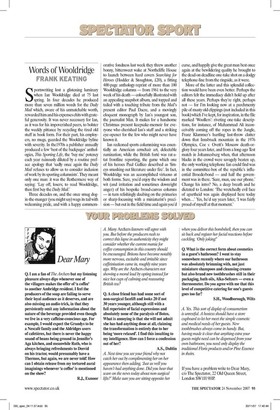Words of Wooldridge
FRANK KEATING Sportswriting lost a glistening luminary when Ian Wooldridge died at 75 last spring. In four decades he produced more than seven million words for the Daily Mail which, aware of his unmatchable worth, rewarded him and his expenses chits with grateful generosity. It was never necessary for Ian, as it was for his impoverished peers, to bolster the weekly pittance by recycling the tired old stuff in book form. For their part, his employers, no mugs, guarded the Wooldridge byline with severity. In the1970s a publisher annually produced a few 'best of the backpages' anthologies, This Sporting Life, the 'buy me' potency each year ruinously diluted by a routine preface apology that 'sadly once again the Daily Mail refuses to allow us to consider inclusion of work by its sporting columnists'. They meant only one man: it was the Rothermere way of saying: 'Lay off, losers; to read Wooldridge, then first buy the Daily Mail.'
Three decades on, and the once smug dogin-the-manger (you might say) wags its tail with welcoming pride, and with a happy commemorative fondness last week they threw another bonny, bittersweet wake at Northcliffe House to launch between hard covers Searching for Heroes (Hodder & Stoughton, £20), a fitting 400-page anthology-reprint of more than 100 Wooldridge columns — from 1961 to the very week of his death — colourfully illustrated with an appealing snapshot album, and topped and tailed with a touching tribute from the Mail's present editor Paul Dacre, and a movingly eloquent monograph by Ian's youngest son, the journalist Max. It makes for a handsome Christmas present keepsake-memoir for everyone who cherished Ian's stuff and a striking eye-opener for the few who might never have known it.
Ian reckoned sports columnising was essentially an American armchair art, delectable rumination; while the British forte was rat-atat frontline reporting, the game which one of his heroes Paul Gallico described as 'limeys smashing out literature under fire'. In fact, Wooldridge was an accomplished virtuoso at both forms. Sure, you'd enjoy the wisdom and wit (and irritation and sometimes downright anger) of his bespoke broad-canvas columns — in turn relishingly daubing on the primaries or sharp-focussing with a miniaturist's precision — but out in the field time and again you'd curse, and happily give the great man best once again at the bewildering quality he brought to the dead-on deadline one-take shot on a dodgy telephone-line from the ringside, as it were.
More of the latter and this splendid collection would have been even better. Perhaps the editors felt the immediacy didn't hold up after all these years. Perhaps they're right, perhaps not — for I'm looking now at a parchmenty pile of musty old clippings (not included in this book) which I've kept, for inspiration, in the file marked Woollers': riveting one-take descriptions, for instance, of Muhammad Ali inconceivably coming off the ropes in the Jungle, Franz Klammer's hurtling last-throw clatter down that Innsbruck mountain in the 1976 Olympics, Coe v. Ovett's Moscow death-orglory four years later, and from a long-ago Test match in Johannesburg when, that afternoon blacks in the crowd were savagely beaten up, the only working telephone Ian could find was in the committee-box of the republic's influential Broederbond — and half the government was in there. 'Sure, mun, use our phone.' Change his intro? No, a deep breath and he dictated to London: The wretchedly evil face of apartheid was again displayed here today when...' Yes, he'd say years later, 'I was fairly proud of myself at that moment.'






































































 Previous page
Previous page